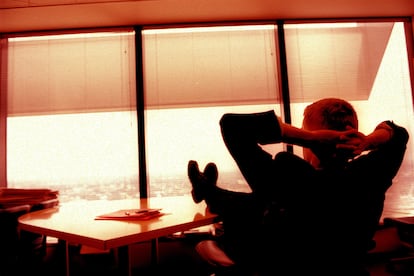How to do absolutely nothing at work: from employee subterfuge to corporate incompetence
From large corporations with neglected employees to salaried workers who get their colleagues to do all their work: there’s a problem at the office, and no one quite knows how to fix it.


Stories of workers who spend years hiding on the job are reminiscent of Shoichi Yokoi, a sergeant in the Imperial Japanese Army who spent nearly three decades hiding in the jungles of Guam’s Mariana Archipelago in the aftermath of World War II, refusing to surrender until he received direct orders from a superior officer. Yokoi went deep into the jungle, surviving on toads, rodents and snakes, and striving to go unnoticed. His plan, an act of stubborn solitary resistance, worked: No one could find Sergeant Yokoi until one spring day in 1974, the sergeant decided he had had enough of hiding.
Like Yokoi, the soldiers of today’s corporate wars — office employees — have managed to hide out for years, camouflaging their inactivity in the jungles of their own workplaces. Writing for Vox, journalist Emily Stewart describes these slacker-workers as “the jobless employed.” In Spain, some extreme examples have come to light in recent years, such as the case of the Valencian civil servant Carles Recio, a world-record holder in the art of skipping out on work, who spent an entire decade going to the office, clocking in every morning, and then proceeding to never complete a single concrete task during all those years.
In Stewart’s view, the pandemic, remote work, automation, outsourcing of workloads, and the organizational disruption that these factors combine to generate, have proliferated a new batch of Yokoi sergeants. These passive resisters and professional absentees have always existed, but now, perhaps, they are more common than ever. Most of them started out as part-time deserters, but over the years, they have perfected their strategies of laziness and deception to the point of being a completely absent presence: they show up to work, but they don’t do any work.
You work, I laugh
Alison Green, author of the hilarious office-worker guidebook, Ask a Manager: How to Navigate Clueless Colleagues, Lunch-Stealing Bosses, and the Rest of Your Life at Work, finds the existence of jobless employees as disconcerting as it is common. In most workplaces, she says, workloads are distributed inefficiently, unevenly and illogically: “The most committed and motivated professionals take on the bulk of important tasks, a silent majority weathers the storm, trying to do as little as possible, and the last group manages to do nothing at all,” she says.

Cristian S., a 43-year-old computer scientist from Barcelona, confesses to belonging to the third group. Cristian, like the other people interviewed for this story, has agreed to speak with EL PAÍS on condition of anonymity. He says at the outset, that he has been “wasting time” at work for more than four years, showing up at the office without making any significant contributions to his company: “You could put it like this: I earn a salary and spend at least 40 hours a week in the office, but I haven’t had a job since I completed the redesign of our internal servers a few months before the pandemic,” he says.
Shortly afterwards, the company Cristian works for was taken over by another firm, and the new owners decided to outsource IT support: “I was kept on the payroll to assume responsibilities for the coordination and supervision of this outsourced service, but the reality is that there’s nothing to supervise or coordinate, and the people I was supposedly overseeing never contact me, and my bosses don’t seem to know I exist.”
As soon as this new period of employed joblessness began, Cristian settled comfortably into the nirvana of well-paid inactivity. He soon got into the habit of going to work, opening his corporate email account first thing in the morning, and then proceeding to spend the rest of the day doing “absolutely nothing.” “In October 2020, when I was ordered to rejoin the office after a discretionary transition period that I stretched out as long as I could, I thought I would be fired almost immediately, as soon as they realized I had nothing concrete to do,” he says.
They forgot about me
But Cristian stayed on the payroll. He was assigned an office “in the company’s catacombs” — a basement floor he describes as “ground zero for the most recent mass layoffs,” where he is “surrounded by empty offices, and my nearest colleague is about 20 meters away.” Here, he has built his castle, which he calls his “Villa Soledad,” or “Lonely Villa.” Cristian says he spends most of his time “smoking, walking, drinking coffee, watching movies and series, listening to music” and even hiding or dozing off in the bathroom.
Cristian doesn’t harbor false hopes: he knows he will be “found” sooner or later. And when that happens, he just hopes that consequences will not be worse than getting laid off under “dignified” conditions, without being forced to provide explanations or suffer reprimands. “After all,” he argues, “the company, and especially the people who are theoretically my direct supervisors, are at least as much to blame as I am.” He is not proud of his indefinite sit-down strike, but attributes it, “above all,” to the incompetence and lack of judgment on the part the new owners. He feels “cornered,” but admits that his situation is not the result of any kind of mistreatment: “They have simply forgotten about me,” he says. “And I’ve contributed to the situation, with my lack of motivation.”

At this point, Cristian has completely dismissed the idea of bringing his case to management or the company’s human resources department: “Maybe it would have made sense to take such a step three years ago, but if I did it now, I would be forced to answer a lot of uncomfortable questions for which I don’t have satisfactory answers. Clearly, I’ve been raking in a pretty generous salary for not doing anything at all,” he says.
Divorce and anxiety
Cristian emphasizes, to dispel any doubts, that he does not find the situation at all desirable. During the time he has been absently present at work, he has faced divorce (“though I should note that our relationship problems started much earlier”) and suffers increasingly frequent anxiety attacks. Doing nothing, he says, “takes its toll.” In spite of everything, he is reluctant to take sick leave, something that would be perfectly understandable given his situation. He says he has developed a kind of superstitious attachment to his office, which he calls his “little easy chair.” He feels “protected” there, he says. And while he has considered looking for another job, he feels he would be unable to adapt to a new corporate environment. He has become accustomed to a life that he himself calls “absurd and empty.”
Daniel M., 59, who works in middle management at a Madrid-based communications firm, where he has been employed since 1993, is facing a similar situation. Daniel became a jobless employee as a result of an unspoken pact: “A few years ago, I was on the shortlist of candidates for promotion, but the company ended up choosing a newcomer who had just finished training with me.” A few months later, his new boss suggested that Daniel be laid off or transferred to another department. “But the human resources manager told him that this was not feasible, that my seniority and salary entitled me to a severance package that the company was not prepared to take on,” Daniel says.
And so began a long period that Daniel refers to, not without a little bitterness, as his “stay at the spa.” “Unless we end up reaching some agreement, which at this point seems highly unlikely, I’ll stay here until I retire,” he says. “Of course I’m appalled that in a company where there is so much left to do, no one wants to make use of my knowledge and experience. But my routine is very pleasant. I have a TV in my office. I can spend my idle hours reading the sports pages, and there are still old colleagues working here who I can chat or eat breakfast with, maybe even some afternoon tea.”
Daniel attributes his situation to the corporate structure, and to a “lack of honesty and common sense” on the part of his superiors. He says they should either fire him or assign him to a different position, adding that he has never refused to perform any of the (increasingly sporadic) tasks they still assign him: “I can’t stand condescension, being treated like an old piece of furniture, as if I wasn’t capable of doing my job, when the truth is that I’m still healthy, informed and intellectually active, and could continue to make a valuable contribution if they asked me to.” But Daniel says he does not have any intentions of exploring new professional horizons: “I’m not willing to lose what I’ve worked toward. I have rights, and I will defend them. I’m not going to leave here without a good-sized check in my pocket. Besides, who would hire me for a serious and dignified position at this point anyways?” he says.

Even more peculiar is the case of Clara G. and Carlos M., who, at 36 and 41 years old are in charge of the “phantom” strategic marketing department at a financial firm, where their services have not been used “for over two years.” “It’s like Carlos and I work at some clandestine pharmacy where no one goes anymore, perhaps because we’ve been moved to a lonely, dark alley,” jokes Clara.
How did this situation come about? “Gradually,” Carlos says, like when “a frog is put in a pot of warm water, and slowly simmers to death.” When they returned to the office after the pandemic, Clara and Carlos began to realize that their company’s revamped management “didn’t really need a strategic marketing department, but wanted to keep it, as a matter of absurd corporate prestige.” So the company just encouraged them, informally, to “go into reserve.” In other words, to remain available, but without attracting too much attention.
Both were granted permission to work up to 80% of their hours from home. The only active supervision they are subject to, apart from the face-to-face meetings of the entire marketing team, which are usually held on Tuesdays and Wednesdays, is the delivery of a series of periodic reports on the evolution of their department, which, according to Clara, are “a constant headache, because it’s frankly complicated to explain what you do when the reality is that you don’t do anything.” Carlos agrees, not without a certain sadness: “In the end, it’s nothing more than an empty formality.”
Both Clara and Carlos assume they will be laid off “sooner or later,” and that no one will miss their specter of a strategic marketing department. In a sense, they are looking forward to it. Like Sergeant Yokoi, they feel the time has come to stop hiding. Clara, however, argues her position with the calm resignation of someone who knows they are being judged (and sentenced) in advance: “How do you give up a salary of more than €50,000 a year just because your bosses have decided they don’t know what to do with you, but still don’t want to fire you?” she says. “We are dependable professionals, we are perfectly capable of coming up with ideas that would create value. But to sell something, you need someone who wants to buy it.”
Carlos says he has “adapted” to their strange situation: “It lets me enjoy my leisure time, my friends, my family. Before, I had been taking on a grueling workload, for 15 years, because my professional career was always my top priority. Somehow, I knew I needed to slow down. And now circumstances have allowed me to do so, and to continue earning a good salary,” he says.
For Emily Stewart, as anecdotal as these cases may be, they should nevertheless be interpreted as symptoms of a larger dysfunction in today’s corporate structures: “Companies tend to be organized in an unnecessarily complex way, and this can create loopholes and dark corners where unmotivated, unscrupulous or simply work-allergic professionals can hide.” Weeds grow in neglected gardens.
What is perhaps most shocking of all, is that the lack of productivity among those who decide not to give a damn goes, in some cases, completely unnoticed. For Stewart, that’s because “many of their colleagues follow corporate rules to the letter, and end up engaging in frenetic activity that is so superfluous and misdirected that it ultimately creates little tangible value.” In other words, amid the hustle and bustle of the larger workforce, the absent presence of a few can go easily unnoticed. Some of those who do work, do it so poorly, or in such a misguided way, that no one even notices the difference between those who work and those who don’t.
Daniel sums up his thoughts on the matter: “My years on the payroll at the spa have turned out to be the perfect training for retirement. When I finally do retire, I’ll go home and do exactly the same things I’m doing now at the office,” he says.
Sign up for our weekly newsletter to get more English-language news coverage from EL PAÍS USA Edition
Tu suscripción se está usando en otro dispositivo
¿Quieres añadir otro usuario a tu suscripción?
Si continúas leyendo en este dispositivo, no se podrá leer en el otro.
FlechaTu suscripción se está usando en otro dispositivo y solo puedes acceder a EL PAÍS desde un dispositivo a la vez.
Si quieres compartir tu cuenta, cambia tu suscripción a la modalidad Premium, así podrás añadir otro usuario. Cada uno accederá con su propia cuenta de email, lo que os permitirá personalizar vuestra experiencia en EL PAÍS.
¿Tienes una suscripción de empresa? Accede aquí para contratar más cuentas.
En el caso de no saber quién está usando tu cuenta, te recomendamos cambiar tu contraseña aquí.
Si decides continuar compartiendo tu cuenta, este mensaje se mostrará en tu dispositivo y en el de la otra persona que está usando tu cuenta de forma indefinida, afectando a tu experiencia de lectura. Puedes consultar aquí los términos y condiciones de la suscripción digital.
More information
Últimas noticias
Welcome to the post-religion era: The idea of Christianity as the absolute truth has become obsolete
‘I thought you would like it’: The risky sexual practice popularized by TV shows and TikTok
The digitalization of tourism: ‘They promise experiences and gave us the worst possible one’
Mexican peso defies uncertainty with forecasts of a new period of stability in 2026
Most viewed
- Sinaloa Cartel war is taking its toll on Los Chapitos
- Reinhard Genzel, Nobel laureate in physics: ‘One-minute videos will never give you the truth’
- Oona Chaplin: ‘I told James Cameron that I was living in a treehouse and starting a permaculture project with a friend’
- Why the price of coffee has skyrocketed: from Brazilian plantations to specialty coffee houses
- Silver prices are going crazy: This is what’s fueling the rally










































